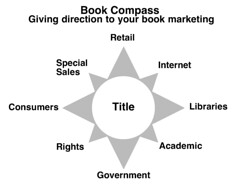The Case for Self-Publishing
I correspond with Lindsay Kellock, a book shepherd in Canada, about the book business. She says that some of her readers are asking her to focus on solving the conundrum of the publishing-marketing-distribution of books.
I said I have to agree. The entire publishing model is based on 20th century thinking and is outmoded. Most notable is the idea of book returns; a practice that started in the Great Depression and has not be changed since then. What other industry allows a buyer to return a product 90- or more days later if they miscalculated the demand? None comes to mind.
The royalty payments modern authors receive are outdated, too. A 5%-7% royalty is a pittance compared to the self-publishing returns. Furthermore, most books don't even earn back their advance against royalties. It's only the John Grishams and Bill Clintons of the world that earn enough money to justify the publisher’s investment. This is why publishers are reluctant to take on "new" authors unless they think the author will be a mega-hit.
I am a big proponent of self-publishing. If the author has a solid idea to whom the book will appeal, then he/she can target that audience better than a publisher selling through bookstores. And every sale will be more profitable.
The challenge is for the author to assume the "risk" a publisher assumes for marketing and distributing the book. It takes money to market and distribute books. One cannot tie up precious capital in printing 3,000-5,000 copies. Short-run, digital printing permits an author to print 500 copies and use the money they save on marketing. Yes, the cost per book for 500 copies is higher, but the overall cash outlay is less. For example, is it better to spend $3 per book at 500 copies ($1,500) than 1.50 per book at 3,000 copies ($4,500). The extra $3,000 can be used for marketing and distribution. If the book sells well, there is cash to reprint (perhaps at a higher quantity, too).
Selling books must happen outside the bookstores if an author is to be successful. The Internet has made direct selling more affordable to self-publishers. That's only the start, however. There are many markets available to a publisher. Please see my illustration of the Book Compass that helps publishers give direction to the markets into which they wish to sell.
For a phenomenal examination of markets outside the bookstores, see Brian Jud's book "Beyond the Bookstore."


0 Comments:
Post a Comment
<< Home